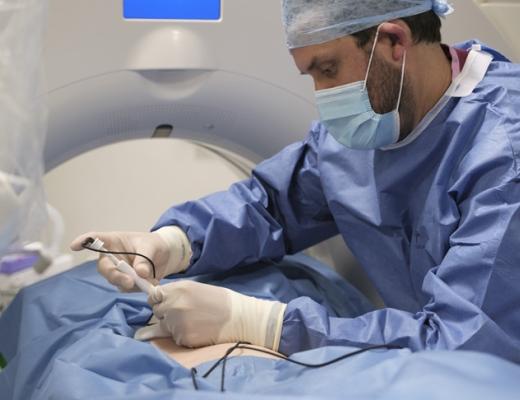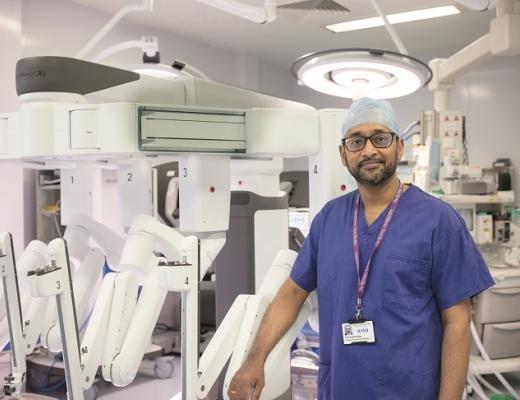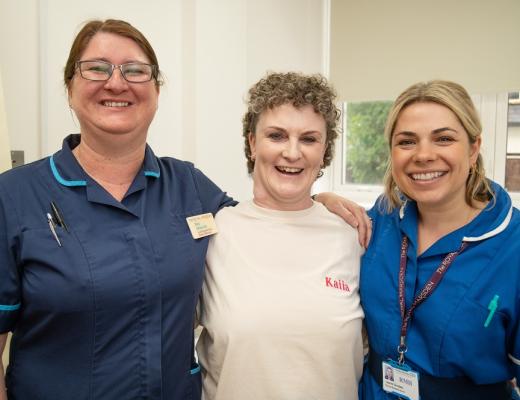Faster recovery and less pain: how robotic-guided surgery is helping cancer patients like Vikki
Following a sarcoma diagnosis in 2016, Vikki’s cancer treatment at The Royal Marsden included robotic-guided ablation – a minimally invasive technique which helps to speed up recovery and reduce pain.
Vikki was diagnosed with leiomyosarcoma in 2016, after an ultrasound and biopsy at her local hospital showed a tumour in her uterus. Leiomyosarcoma is a type of soft tissue sarcoma – a rare form of cancer which starts in the body’s soft tissue, such as fat, muscle or connective tissue.
“I was gobsmacked” says Vikki. “Cancer was very last thing I thought it would be. I had experienced a post-menopausal bleed which prompted me to get myself checked, but even when my doctor found abnormal cells, I didn’t think it could be cancer. You could have knocked me over with a feather when I was diagnosed.”
Undergoing a robotic hysterectomy surgery with the da Vinci Xi robot
Following her diagnosis, Vikki was referred to The Royal Marsden, where she had a full hysterectomy. This was performed robotically by Marielle Nobbenhuis, Consultant Gynaecological Oncology Surgeon and Head of Surgery, using the da Vinci Xi surgical system.
The da Vinci Xi robot was funded by supporters of The Royal Marsden Cancer Charity, and it is used to treat patients with a broad range of cancer types. Robotic surgery allows complex procedures to be performed using minimally invasive keyhole surgery, meaning faster recovery times and less scarring for patients.
“My surgery and recovery went well. I know a friend who had the same procedure with open surgery and it took her 12 weeks to recover, whereas I was up and about in three weeks.” says Vikki.
‘Zapping’ cancer with heat
Vikki continued to be monitored closely by her clinical team using CT scans and chest X-rays. Unfortunately, in 2018, it was discovered that the cancer had spread to her lungs.
Her lung tumours were treated with three rounds of radiofrequency ablation (RFA) – a minimally invasive alternative to surgery where heat from radio waves is used to destroy cancer cells - as well as radiotherapy and immunotherapy.
Thanks to her lung ablations, Vicky’s tumours have shrunk and her cancer is stable.
Vikki’s most recent ablation was performed robotically. The Royal Marsden is among just a handful of centres worldwide that provides robotic-guided ablation technology to treat lung tumours.
RFA is traditionally guided by hand, but now, a robotic arm can be used to assist with the procedure, which ‘zaps’ the cancer with heat.
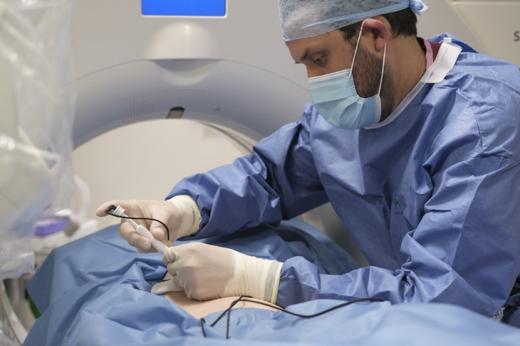
The robotic-guided treatment uses a needle inserted through a ‘pinhole’ skin incision, just 1.5 millimetres wide. Compared with other surgical techniques, this can mean a faster recovery time, less pain, and no scarring.
Vikki says: “My team had discussed other options including radiotherapy and surgery. Surgery would have been quite invasive, so I’m pleased they decided ablation was the best option.”
“When I found out that it would be performed robotically, I was intrigued. This experience with my hysterectomy meant my expectations for the robotic ablation were good, as I know first-hand how robotic technology can improve procedures.”
Robotic guided surgery offers new options for cancer patients
Dr Ed Johnston, Academic Consultant in Interventional Oncology, whose role is part-supported by The Royal Marsden Cancer Charity, is one of the clinicians carrying out exciting research into ablation.
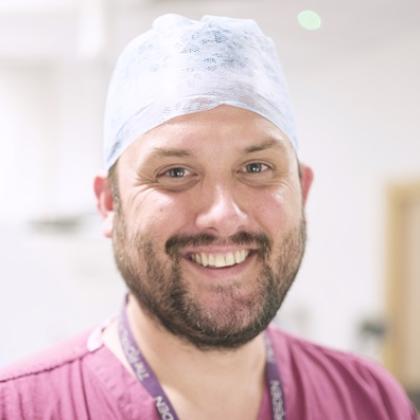
“At The Royal Marsden, we’ve now performed over 200 robotic lung ablations, and our experience has been extremely positive." says Dr Ed Johnston. "These procedures are typically fast and efficient, with patients experiencing low recurrence rates, quick recovery, and reduced pain.”
“We have also recently expanded into robotic lung cryoablation, a technique which uses extreme cold to freeze and destroy cancerous cells, guided by robotic assistance. This allows us to treat more complex cases — including larger tumours and those in challenging or high-risk locations — with excellent precision.”
Thanks to the rapid advancements in technology, the use of robotics in cancer care is becoming increasingly common and it’s revolutionising how cancer specialists approach diagnosis, treatment and care.
For patients, this is already resulting in a shift toward more minimally invasive surgeries and procedures, quicker recovery times, less pain and fewer complications.
Living life to the fullest, whilst managing sarcoma
Vikki continues to come to The Royal Marsden, receiving immunotherapy in the Charity-funded Diane McCarthy Medical Day Unit.
“I cannot praise The Royal Marsden enough. The staff are all so professional, caring and so kind. It just feels like everyone goes the extra mile for the patient.”
“I’m very blessed that I’m not experiencing any symptoms. Thanks to the treatment I’ve received, I’m able to do the things I love, like reading, walking, and baking, as well as spending time with my friends and family. If you looked at me, you would not think I have cancer.”
Your support is improving the lives of cancer patients everywhere
Thanks to our generous donors, we are able to support specialists like Dr Ed Johnston, and fund the latest equipment – like the da Vinci Xi robot. This not only helps patients like Vikki, but supports the development of new, more effective ways to treat cancer for patients across the UK and around the world.
Discover more about ways you can support us today
Read more stories like this
